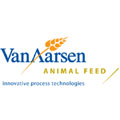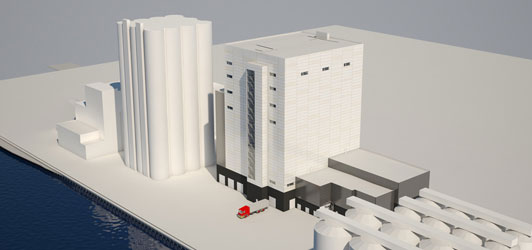 In Kalmar, in the south of Sweden, Van Aarsen International shall supply, build and towards the end of 2013 start up a 90 tons per hour feed mill.
In Kalmar, in the south of Sweden, Van Aarsen International shall supply, build and towards the end of 2013 start up a 90 tons per hour feed mill.
Last week an intensive sales process was rewarded with a signature for approval under the largest independent order ever in the 63 year history of Van Aarsen.

With the purchase of this new state-of-the-art feed mill, being a total investment of 45 million euros, Kalmar Lantmän will be able to increase their animal feed production to 275,000 ton per year.
The motivation behind replacing their two existing feed mills was to create lower production costs per ton animal feed, by using the highest degree of automation, flexibility and efficiency and at the same time achieving vast improvements in hygienic production, ATEX and fire safety with a considerable reduction in labour and energy costs.
“Our first contact with the client was in 2009” reports Piet van Bommel, Area Sales Manager Europe and responsible person for this sale. “During a regional sales meeting for our European network held in Finland, we visited a newly built Van Aarsen feed mill that had just opened. We invited potential customers from Scandinavia including Kalmar Lantmän, to join us so we could demonstrate to them what Van Aarsen is capable of”.
One year later the first meetings took place with Kalmar Lantmän regarding the new plant. From then onwards there was intense collaboration via a project team of Van Aarsen and Kalmar Lantmän to get the best possibilities down on ‘paper’.
Finally the additional advantages Van Aarsen had to offer made the difference with respect to the renowned competition.
One contact person for the entire project, the capacity to think integrally together with the customer, the production of high quality products, superior automation solutions, the possession of experience, know-how and expertise and being able to offer no-nonsense advice are all factors that gave Kalmar Lantmän the confidence to go to sea with Van Aarsen.
In contrast to Sweden as a whole, the livestock and milk production in the south east of the country is growing and Kalmar Lantmän expect a continual growth and prominent expansion in the chicken and pork industry sector in Sweden.
The construction of the new plant between the two existing feed mills will begin in the spring of this year. The complete investment of this project is the largest in history for the cooperative.
For Van Aarsen this large order doesn’t mean that production problems will arise or that there will be no more capacity for other orders. “The production planning for this project has been meticulously defined in advance” reports Guus Heijnen, Sales Director. “This order has fallen perfectly into place in our expanding organisation, notwithstanding that an order of this format will obviously pose a great challenge.”

Efficiency, quality, lower production costs, legislation, (food-)safety and ever-rising energy costs lead to conscious decisions having to be made in the design phase of machines and projects.
Recent activities for compound feed companies and co-operations have comprised mainly mergers and replacements and resulted in little new construction in The Netherlands. The home market, Western Europe, is however very important to Van Aarsen for the initiation of market demands.
“We were ready for a large project in the ‘vicinity’ that will offer us a marvellous opportunity for a new reference project that can demonstrate fully all the requirements of a twenty-first century feed mill”.
“At Kalmar Lantmän all these facets have been taken into consideration” indicates Marc Schlechtriem, Project Engineer. “Separate production lines for pigs, chicken and cattle feed, a very extensive raw material dosing system for macro and micro components, high capacity hammer mills with automatic screen exchange for high flexibility, long conditioning times for the hygienisation of the feeddestruction of salmonella, bulk loading robots for rapid charging of the bulk carriers are all completely automated by an extensive intelligent automation system that can, if necessary, be remotely controlled by our IT Department for service or support. Technically as well as functionally “State of the Art”.
April 2012 - Van Aarsen International


